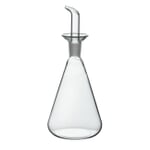Oil or vinegar bottle borosilicate glass

Oil or vinegar bottle borosilicate glass
- Made of robust borosilicate glass
- Perfect for food storage
- Proven: pours slowly, quietly and spill-free
General Information
Timeless Material for the Use in the Kitchen.
This material has made history. The unproblematic material allowed designers to develop a reduced aesthetic for household items. Since the 1920s, refractory glassware has been used by top Bauhaus designers. It was the first time that a “technical” glass was produced, and it inspired them in a functional and formal sense. They introduced this ideal and utterly timeless material for the use in the kitchen, and this is precisely the place where it hasn’t lost any of its charms down to the present day.
Borosilicate Glass: Jena Glass. Laboratory Glass in the Home.
Borosilicate glass was developed in 1891. Ernst Abbe and Otto Schott designed it having in mind a special glass for the optical and chemical industry. From the Jena glassworks, the glass with the unique product features promptly went on to conquer the world. In the nearby Bauhaus school of design in Weimar, Wilhelm Wagenfeld, Bruno Mauder, and Ilse Decho were fascinated with the idea of using laboratory glass in the kitchen and gave the new material a contemporary form.
Tensioning, but tension-free. Vessels made of borosilicate glass
This material has made history. The unproblematic material allowed designers to develop a detached, reduced aesthetic - since the 1920s, "fireproof" utility glass has been used by top designers from the Bauhaus environment. This gave rise for the first time to glass that was "technical" in both formal and material terms. Well-known greats such as Wilhelm Wagenfeld, Bruno Mauder and Ilse Decho gave it its contemporary form and found new uses for it. László Moholy-Nagy took care of the advertising. They used this ideal, completely timeless utility glass in the kitchen in particular, and that is precisely where it continues to develop its very own charm today. The oil or vinegar bottle, for example, you can still see their origin from the laboratory.
Product Information
Article Number 81470
- Made of robust borosilicate glass
- Perfect for food storage
- Proven: pours slowly, quietly and spill-free
With a ground-in spout. On the side of the stopper there is a small groove which allows for the release of air and an even, slow pouring. Excess liquid is led back into the vessel.
Made of heat-resistant glass.
Small. Volume 250 ml. Height 20 cm, Ø 8.5 cm. Weight 140 g.
Have a question?
If you have a question concerning this product you are welcome to contact us. For this your E-Mail program will open.
Contact Us
For advice, spare parts or special requests - our customer service will take care of your questions and concerns, personally and competently.
You can reach us from Monday to Friday at +49 2309 939095 or anytime at info@manufactum.com
Gift Certificates
It is good for everything: With our PDF gift certificates you can choose from the entire Manufactum selection. Pick a motif which you can send by email or print out and present personally, immediately after submitting your order.
Order now


